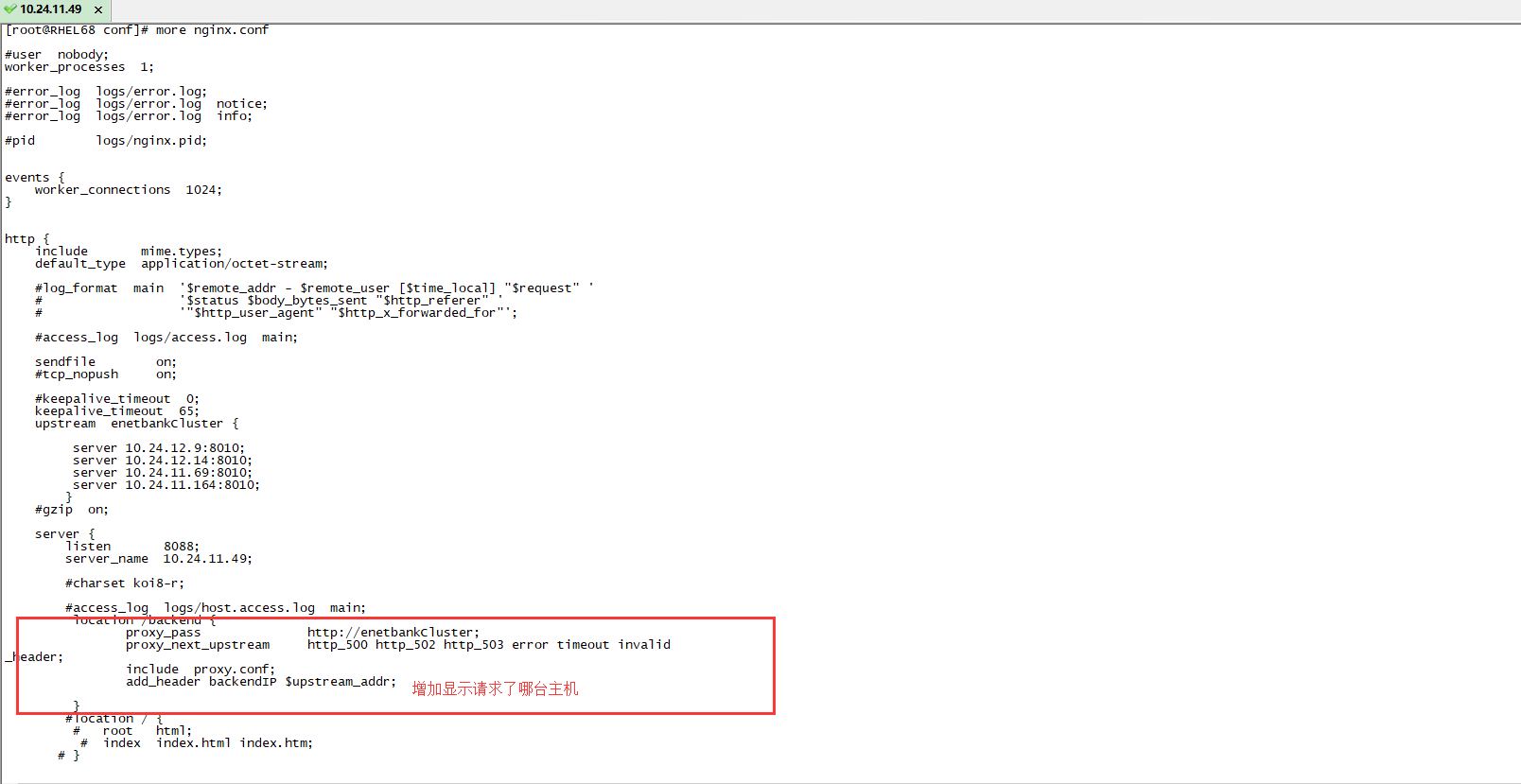nginx的具体作用不用细说,很强大,做负载均衡、反向代理服务器解决前端跨域问题等等。下面是nginx的安装过程
首先nginx主要的依赖:
1 pcre、 pcre-devel 2 zlib zlib-devel 3 openssl openssl-devel
因此安装nginx需要安装以下依赖(本教程只介绍centos在线安装,离线安装见另一篇文章)
1.安装依赖
1 yum install gcc 2 yum install pcre-devel 3 yum install zlib zlib-devel 4 yum install openssl openssl-devel
2.下载解压nginx
2 cd /usr/local 3 mkdir nginx 4 cd nginx 5 //下载tar包 6 wget http://nginx.org/download/nginx-1.13.7.tar.gz 7 tar -xvf nginx-1.13.7.tar.gz (解压文件)
3.安装nginx
1 //进入nginx目录 2 cd /usr/local/nginx-1.13.7 3 //执行命令 4 ./configure 5 //执行make命令 6 make 7 //执行make install命令 8 make install
4.配置nginx
cd到nginx配置文件,配置相应的信息数据,主要是配置好upstream 以及server即可,现在贴出我本机的配置
cd /usr/local/nginx/conf
vim nginx.conf

5.测试nginx是否配置正确
/usr/local/nginx/sbin/nginx -t
如果出现以下所示,则配置没有问题

6.nginx的启停
启动 [root@localhost ~]# /usr/local/nginx/sbin/nginx 停止/重启 [root@localhost ~]# /usr/local/nginx/sbin/nginx -s stop(quit、reload) 命令帮助 [root@localhost ~]# /usr/local/nginx/sbin/nginx -h 验证配置文件 [root@localhost ~]# /usr/local/nginx/sbin/nginx -t 配置文件 [root@localhost ~]# vim /usr/local/nginx/conf/nginx.conf
其他介绍
1.VIM语法
默认vim打开后是不能录入的,需要按键才能操作,具体如下:
开启编辑:按“i”或者“Insert”键
退出编辑:“Esc”键
退出vim:“:q”
保存vim:“:w”
保存退出vim:“:wq”
不保存退出vim:“:q!”
2.nginx配置语法介绍
1 #user nobody; 2 3 #开启进程数 <=CPU数 4 worker_processes 1; 5 6 #错误日志保存位置 7 #error_log logs/error.log; 8 #error_log logs/error.log notice; 9 #error_log logs/error.log info; 10 11 #进程号保存文件 12 #pid logs/nginx.pid; 13 14 #每个进程最大连接数(最大连接=连接数x进程数)每个worker允许同时产生多少个链接,默认1024 15 events { 16 worker_connections 1024; 17 } 18 19 20 http { 21 #文件扩展名与文件类型映射表 22 include mime.types; 23 #默认文件类型 24 default_type application/octet-stream; 25 26 #日志文件输出格式 这个位置相于全局设置 27 #log_format main '$remote_addr - $remote_user [$time_local] "$request" ' 28 # '$status $body_bytes_sent "$http_referer" ' 29 # '"$http_user_agent" "$http_x_forwarded_for"'; 30 31 #请求日志保存位置 32 #access_log logs/access.log main; 33 34 #打开发送文件 35 sendfile on; 36 #tcp_nopush on; 37 38 #keepalive_timeout 0; 39 #连接超时时间 40 keepalive_timeout 65; 41 42 #打开gzip压缩 43 #gzip on; 44 45 server { 46 #监听端口,默认是80端口 47 listen 80; 48 #监听域名 49 server_name localhost; 50 51 #charset koi8-r; 52 53 #nginx访问日志放在logs/host.access.log下,并且使用main格式(还可以自定义格式) 54 #access_log logs/host.access.log main; 55 56 #如果没有location更明确的匹配访问路径的话,访问请求都会被该location处理。 57 location / { 58 #root指定nginx的根目录为/usr/local/nginx/html 59 root html; 60 #默认访问文件,欢迎页先去html目录下找index.html,如果找不到再去找index.htm 61 index index.html index.htm; 62 } 63 64 #error_page 404 /404.html; 65 # redirect server error pages to the static page /50x.html 66 # 67 68 #错误页面及其返回地址,错误码为500、502、503、504都会返回50.html错误页面。 69 error_page 500 502 503 504 /50x.html; 70 #location后面是"="的话,说明是精确匹配 71 location = /50x.html { 72 root html; 73 } 74 75 # proxy the PHP scripts to Apache listening on 127.0.0.1:80 76 # 77 #location ~ .php$ { 78 # proxy_pass http://127.0.0.1; 79 #} 80 81 # pass the PHP scripts to FastCGI server listening on 127.0.0.1:9000 82 # 83 #location ~ .php$ { 84 # root html; 85 # fastcgi_pass 127.0.0.1:9000; 86 # fastcgi_index index.php; 87 # fastcgi_param SCRIPT_FILENAME /scripts$fastcgi_script_name; 88 # include fastcgi_params; 89 #} 90 91 # deny access to .htaccess files, if Apache's document root 92 # concurs with nginx's one 93 # 94 #location ~ /.ht { 95 # deny all; 96 #} 97 } 98 99 100 # another virtual host using mix of IP-, name-, and port-based configuration 101 # 102 #server { 103 # listen 8000; 104 # listen somename:8080; 105 # server_name somename alias another.alias; 106 107 # location / { 108 # root html; 109 # index index.html index.htm; 110 # } 111 #} 112 113 114 # HTTPS server 115 # 116 #server { 117 # listen 443 ssl; 118 # server_name localhost; 119 120 # ssl_certificate cert.pem; 121 # ssl_certificate_key cert.key; 122 123 # ssl_session_cache shared:SSL:1m; 124 # ssl_session_timeout 5m; 125 126 # ssl_ciphers HIGH:!aNULL:!MD5; 127 # ssl_prefer_server_ciphers on; 128 129 # location / { 130 # root html; 131 # index index.html index.htm; 132 # } 133 #} 134 135 } 136 137 --------------------- 138 139 本文来自 PengTDY 的CSDN 博客 ,全文地址请点击:https://blog.csdn.net/yougoule/article/details/78186138?utm_source=copy
No mapping for the Unicode character exists in the target multi-byte code page
使用windows版本的nginx启动时遇到(1113: No mapping for the Unicode character exists in the target multi-byte code page)这个错误
后来查阅资料发现是因为解压的路径里面包含有中文的缘故,只要把解压后的文件剪切到没有包含中文的目录即可解决问题